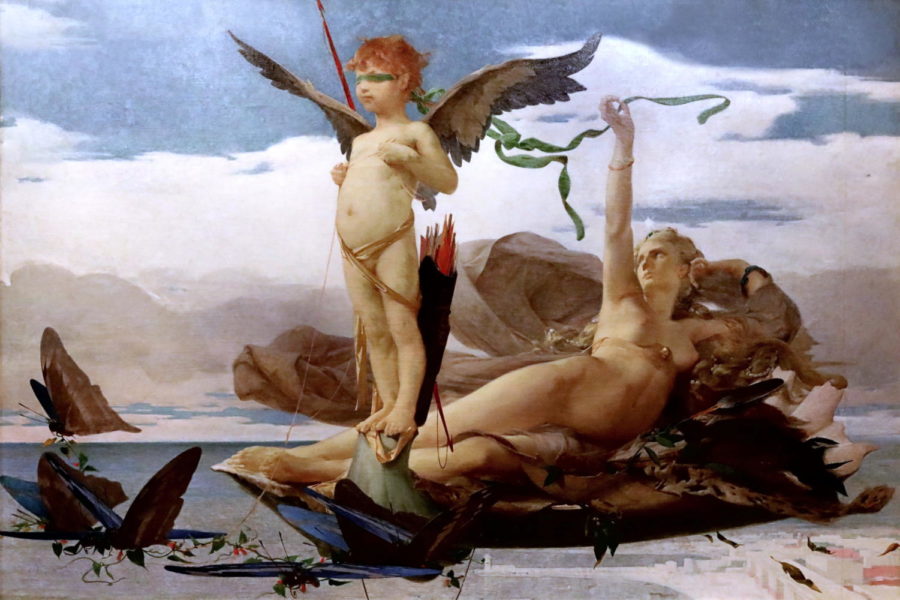Vieira: Reclaiming feminine power in ancient Greek mythology
November 17, 2020
Mythology was a defining aspect of ancient Greek culture, so much so that these myths and legends managed to survive up to this day. Stories, originally transmitted by word of mouth, attempt to explain natural occurrences like day and night, as well as more profound human issues like love and hatred. Although often permeated with misogynistic narratives, myths present some early feminist thought here and there. For instance, in the tale regarding the dispute between Athena and Poseidon over Attica, we observe the aforementioned ideals.
The progressive city-state was governed by the wise king Cecrops, who was an innovator himself, known to have made his region the most civilized in the world; he forbade human as well as animal sacrifices, established monogamy and the option of marriage, created the first law courts and gave not only men but also women the right to vote. Cecrops later disclosed to the two Olympians that “the god who gives men the most useful gift” will be chosen as the city’s patron. Not too long after the king ceased speaking, Poseidon bashed the ground with his trident; water began to flow on the dry soil, creating an enormous swimming pool that could be used for leisure activities. The gift also included a magic water war horse for Cecrops.
Athena pondered on the question a bit longer than her rival, but after arriving to a conclusion, with a swift hand gesture, she produced a tree with a thick trunk and leaves shaped like a lance head. She explained that this evergreen is an olive tree, and its pressed fruit can provide nourishment, remarking that it is a symbol of the peace and fertility she brings them. After considering the two options, the city’s dwellers began to vote in order to elect who they deemed more suitable for the role of protector. Ironically enough, it is thanks to the women’s votes that the election tilted in favor of Athena, making her the winner of the contest. Later, the king changed the name of the city to “Athens” in honor of the goddess.
Here, we observe the concept of choosing wisdom and knowledge over brute force and the portrayal of women as bearers of power, in this way resisting male power. Doing so, the female character breaks away from the “good woman” character and more into that of a “bad woman” character, which, despite its negative connotation, decomposes the gender sphere through the display of typical masculine behavior.
Another important remark of ancient Greek mythology comes from Allison J. van Tilborgh, scholar of religion and interfaith communication, on how much gender is tied to the universe, like the myth of Gaia, mother of everything. Claire Bicker’s article on gender and sexuality in ancient Greece also explores the concept of the female body using Aphrodite as an example, who is presented naked most of the time. Her body, although naked, is not seen as scandalous or taboo but rather as something progressive.
Last but not least, I would like to talk about the myth of Medusa. In my opinion, this is the most important myth for us women to reclaim because of its widespread misinterpretation and patriarchal appropriation. The mortal Gorgon became an icon of female rage and stood out from the others because of her humanity and relatability.
The story suggests that Medusa is the villain because she is too beautiful, inducing Poseidon to be taken over by lust, prompting him to rape her right there and then in Athena’s temple. Originally, the myth proposes that Athena punishes Medusa because of her broken chastity promise; nonetheless, I beg to differ. Athena wants to protect Medusa from the male gaze. As Emily E. Culpepper puts it, this transformation is a response to male aggression.
The Gorgon is also symbolic for Black women, as the snake hair is interpreted as dreadlocked hair, according to Luisah Teish. Medusa’s story is very much comparable to what women of color go through on a daily basis, as they are three times more likely to die as a result of domestic violence, making it one of the leading causes of death for Black women (ages 15 to 35). Furthermore, it could be inferred that there is an interesting correlation here: the etymology of the word “Medusa” reveals to us that the term actually means “guardian,” which, in my opinion, puts her in a position of defendant of all those who are oppressed under unjust circumstances: their patron.
We are so used to narratives of women competing with each other that when we detect the slightest bit of comradeship, we begin to question ourselves because of the chauvinist lens through which stories like this are viewed.

















